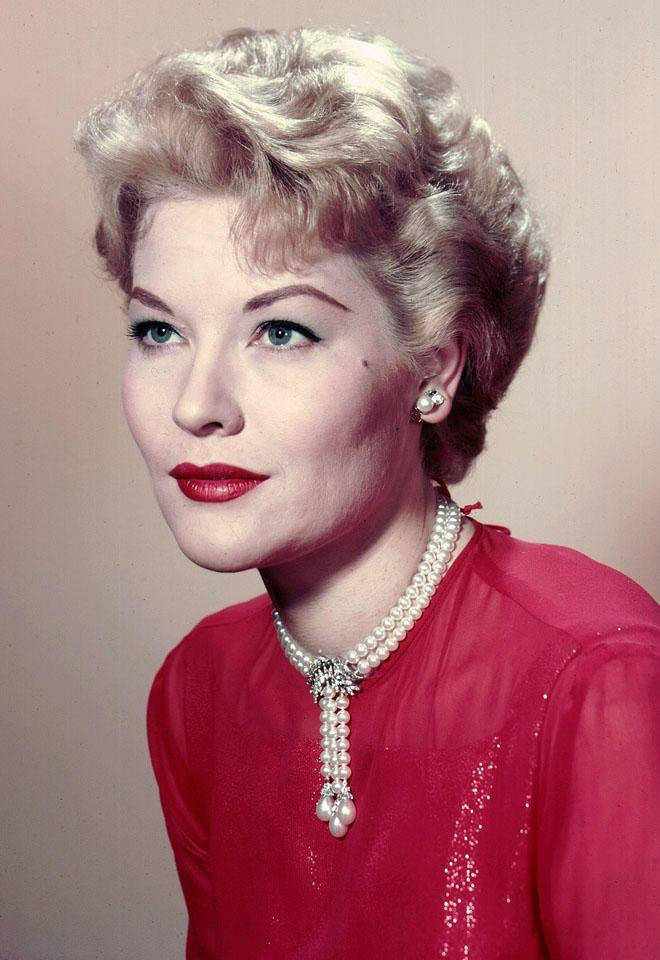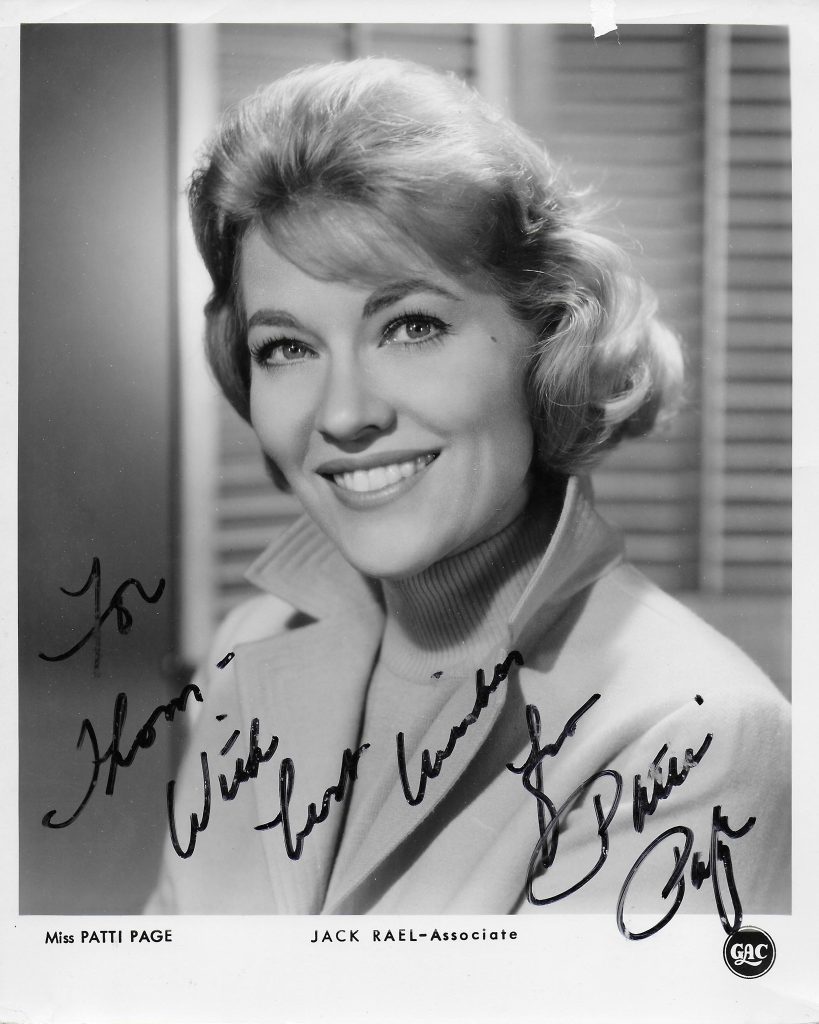January 1, 2013 – Singer Patti Page died in California at age 85
Speaking about her early years in northeast Oklahoma, Patti Page describes the life of a railroad foreman’s family during the Great Depression: “My father was a laborer on the railroad,” Page said. “We lived in section houses – the railroad gave section houses to the foreman and his crew. Sometimes they were good section houses and sometimes they were bad, but they were all poor. We had our own garden and my mother had a cow and a pig – that’s how we ate. We had meat with our Sunday dinner, but we had a lot of corn bread and milk for supper during the week.”The family moved from town to town, including brief stints in Pawhuska, Jenks and Muskogee, before settling in Tulsa. While Patti’s mother wouldn’t allow the children to listen to music on the radio for fear of wasting electricity, they were allowed to tune in to the “Eddie Cantor Show” and “The Chicago Barn Dance” from time to time.”I was a kid from Oklahoma who never wanted to be a singer, but was told I could sing. And things snowballed.”Patti Page’s tremendous singing talent was discovered early. When the lead singer at local radio station KTUL came down with laryngitis, Patti jumped at the chance, auditioned and won the job.

From her freshman year through her graduation in 1945, Patti Page would ride the bus from Daniel Webster High School downtown to KTUL, which was located on the top floors of Tulsa’s National Bank Building, record her show at 3:30 in the afternoon and then hit the downtown Tulsa clubs, such as the Benglair Club and Casa Loma Ballroom, where she would lend her vocals to acts from Al Clauser and His Oklahomans to Bob Wills and his Texas Playboys. It was during her years at KTUL that Patti officially changed her name from Clara Ann Flower to Patti Page, a moniker inspired by the Page Milk Company, one of the program’s sponsors.After high school graduation, Page was offered an art scholarship to the University of Tulsa. As fate would have it, Jack Rael, road manager and baritone saxophone player for the Jimmy Joy Band, heard Patti sing on the radio while he was traveling through Tulsa. Jack contacted Patti and offered to make her a star in Chicago. Needless to say, Patti turned down the scholarship and never looked back.Page toured the country and ended up in Chicago by 1947, where she sang in a small-group outing by Benny Goodman and gained a recording contract with Mercury. Her first hit, “Confess,” came that same year and made her the first pop artist to overdub harmony vocals onto her own lead.She ended up singing with the Benny Goodman Septet on the top-rated Breakfast Club show on Chicago Radio in 1948 and Rael became Page’s manager, a position he kept for over 40 years.Patti made music history that same year when she recorded “Confess,” her first hit single and one on which she overdubbed her own voice to create the effect of a vocal group, making “Confess” a benchmark for studio technology.

In 1949, Page used the overdubbing technique again on “With My Eyes Wide Open I’m Dreaming,” her first million-seller which in 1950 earned her the first of 18 gold records (the added touch came with listing it as “the Patti Page Quartet”). A more modern orchestral backing was added when the song was re-released 10 years later.Also in 1950, “All My Love” became her first #1 hit and spent several weeks at the top. That same year produced the biggest hit of her career, “The Tennessee Waltz.” Notched at #1 for 30 weeks, it eventually became one of the best-selling singles of all time and prompted no less than six Top 40 covers during the following year alone. Over the years it would sell 10 million copies.
During 1952-1953, Patti Page scored two more huge hits with “I Went to Your Wedding” and “The Doggie in the Window,” both of which spent more than two months at #1. She gained her own television program, “The Patti Page Show” in 1955 and moved into full-length LPs with “In the Land of Hi Fi” and “Manhattan Tower”.
Patti was the best-selling female vocalist of the 1950s, and was wildly popular all through the 1960s. She got national exposure on other TV shows, appearing on such top-rated television programs as “The Dean Martin Show” (1965). Page also proved more resilient to the rise of rock & roll than most of her contemporaries, hitting big in 1956 with “Allegheny Moon” and “Old Cape Cod” the next year. Indeed, she kept reaching the charts (if only in moderate placings) throughout the ’60s, paced by the Top Ten theme to the film “Hush, Hush, Sweet Charlotte” in 1965.
In 1968 she recorded what some consider her signature song, “Have a Little Faith and Love Will Come to You.” Patti continued to thrill fans for decades. Though she stopped recording for the most part in 1968, she continued performing into the 1990s. In 1999 she received a Grammy for her “Live at Carnegie Hall” album, a compilation from her 50th-anniversary concert. In her lifetime, she racked up a staggering 111 hits, 15 gold records and four gold albums.
SOURCES
http://www.imdb.com/name/nm0656303/bio
http://www.nndb.com/people/205/000045070/
http://www.songwritershalloffame.org/artists/C4060
http://www.cmt.com/artists/patti-page/biography/
http://www.encyclopedia.com/doc/1G2-3492900059.html
http://www.allmusic.com/…/patti-page…/biography
